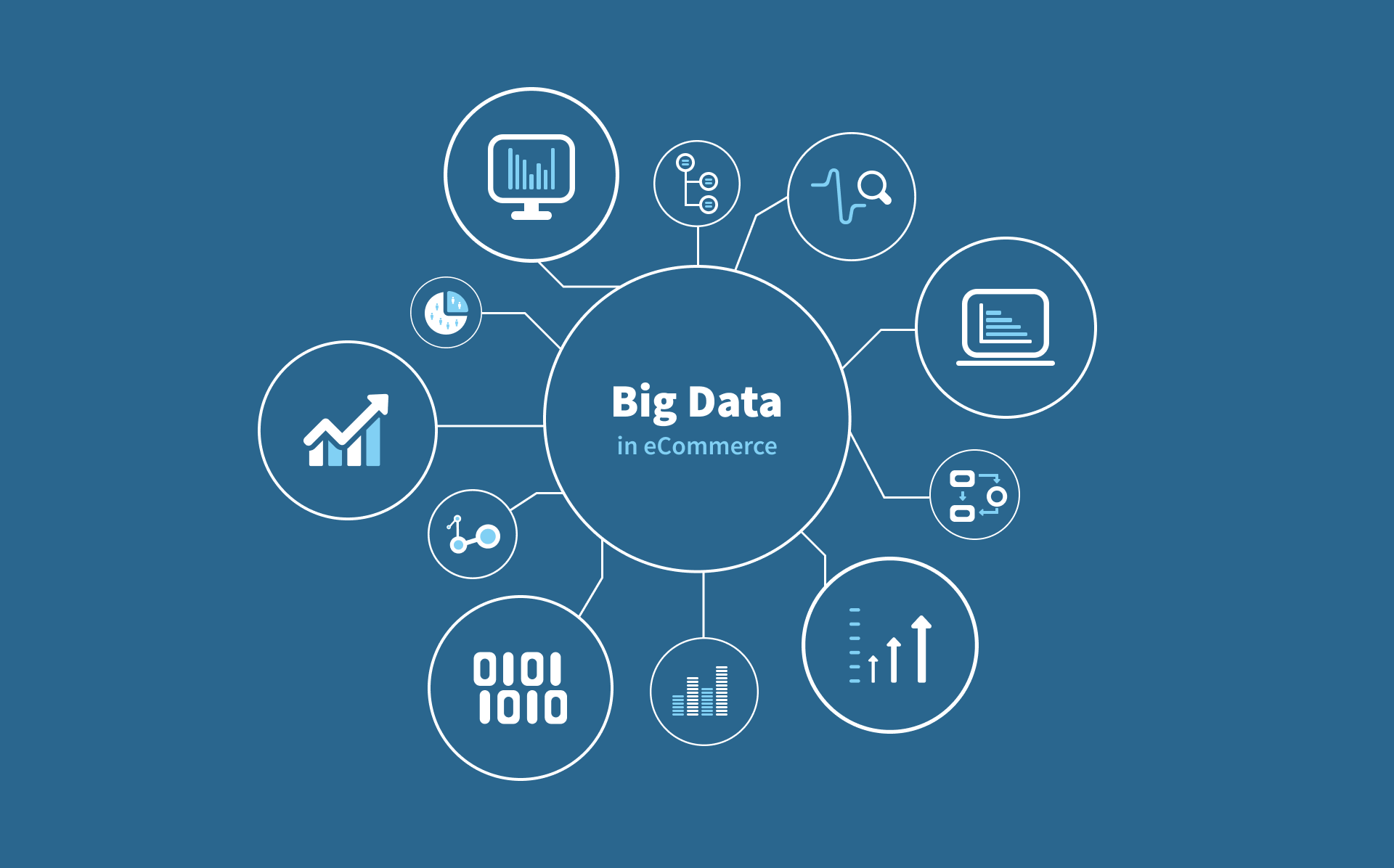Big Data E-Commerce: Overview, Use Cases, Illustrations, and Forecasts Through 2024

Big Data, the ever-expanding ocean of e-commerce data, offers organizations enormous opportunity to customize customer experiences, streamline processes, and spur growth. This blog explores the realm of big data e-commerce, giving readers a thorough rundown, examining the variety of use cases it has through actual situations, and presenting projections for its impact until 2024. Prepare to learn how big data is changing the face of e-commerce and how to use its potential to stay ahead of the competition.
Big Data E-Commerce: Overview
Big data in e-commerce industry refers to the collection, processing, and analysis of vast amounts of data generated within the e-commerce industry. E-commerce platforms generate a significant volume of data from various sources, including customer interactions, transactions, website visits, social media, and more. The term "big data" is used to describe the immense volume, velocity, and variety of this data.
Big Data E-Commerce: Key Aspects

Here are key aspects of big data in e-commerce:
Data Volume: Role of big data in E-commerce platforms deal with massive amounts of data daily. This includes information about customer profiles, purchase history, product details, website interactions, and more.
Data Velocity: The speed at which data is generated, processed, and analyzed is crucial in e-commerce. Real-time data processing is often necessary to provide timely insights and personalized experiences for customers.
Data Variety: Big data and ecommerce comes in various formats, such as structured data (like databases), semi-structured data (like XML or JSON), and unstructured data (such as social media comments or customer reviews).
Data Veracity: Ensuring the accuracy and reliability of the data is crucial for making informed business decisions. Inaccurate data can lead to flawed analyses and poor decision-making.
Data Value: The primary goal of leveraging big data in e-commerce is to extract valuable insights. This includes understanding customer behavior, predicting trends, optimizing supply chain management, and improving overall business performance.
Personalization: Big data enables e-commerce data management businesses to personalize the shopping experience for individual customers. By analyzing past behavior, preferences, and purchase history, businesses can recommend products, tailor marketing messages, and enhance customer engagement.
Predictive Analytics: E-commerce companies use big data analytics to predict future trends, customer preferences, and market demand. This helps in inventory management, pricing strategies, and anticipating changes in the market.
Fraud Detection: Big data analytics plays a crucial role in identifying and preventing fraudulent activities in e-commerce customer data, such as credit card fraud or account hijacking. Analyzing patterns and anomalies helps detect suspicious behavior.
Supply Chain Optimization: E-commerce businesses use big data to optimize their supply chains, ensuring efficient inventory management, reducing costs, and improving overall operational efficiency.
Big Data E-Commerce Use Cases
By leveraging big data analytics, e-commerce businesses can unlock a multitude of benefits, including:
Personalized Customer Experiences: Big data in Ecommerce allows businesses to understand individual customer preferences, past purchases, and browsing behavior. This information can be used to personalize product recommendations, offers, and content, leading to a more engaging and satisfying shopping experience.
Optimized Pricing and Promotions: By analyzing historical sales data, competitor pricing, and market trends, businesses can set optimal prices for their products and tailor promotions to specific customer segments. This ensures they remain competitive while maximizing profitability.
Improved Inventory Management: Big data ecommerce helps businesses forecast demand for products more accurately, preventing stockouts and overstocking. This translates to reduced costs, increased customer satisfaction, and improved operational efficiency.
Enhanced Fraud Detection: Big data ecommerce analytics can be used to identify patterns in fraudulent activities, such as suspicious purchase behavior or unusual access attempts. This helps businesses implement robust security measures to protect their customers and financial data.
Targeted Marketing Campaigns: Big data ecommerce empowers businesses to segment their customer base and target specific groups with personalized marketing campaigns. This increases the effectiveness of marketing efforts and maximizes return on investment (ROI).
Dynamic Content Delivery: Businesses can leverage big data to personalize website content based on user location, demographics, and browsing history. This ensures that each customer sees the most relevant information and product offerings, enhancing the overall engagement.
Product Development and Innovation: By analyzing customer reviews, social media sentiment, and purchase trends, businesses can gain valuable insights into customer needs and preferences. This information can be used to develop new products, improve existing ones, and stay ahead of the curve in a competitive market.
Big Data E-Commerce Illustrations

While we discussed the numerous uses of big data in e-commerce, let's now look at some actual big data ecommerce examples to see how these ideas are put into practice:
Amazon's Recommendation Engine: One of the most prominent examples of big data in ecommerce is Amazon's recommendation engine. By analyzing vast amounts of data on customer purchases, browsing behavior, and search history, Amazon can recommend products that are highly relevant to each individual user. This personalized approach keeps customers engaged, leads to more purchases, and ultimately increases revenue for Amazon.
Netflix's Personalized Content: Similar to Amazon, Netflix utilizes big data to personalize content recommendations for its subscribers. By analyzing viewing history, ratings, and search patterns, Netflix can predict what shows and movies a user is most likely to enjoy. This not only enhances the user experience but also helps Netflix retain subscribers and stand out in the competitive streaming market.
Spotify's Discover Weekly Playlists: Spotify leverages big data to curate personalized playlists like "Discover Weekly" for each user. By analyzing listening habits, genres favored, and artist preferences, Spotify creates unique playlists that cater to individual tastes. This personalized approach fosters user engagement and keeps them coming back for more.
Alibaba's Dynamic Pricing: Alibaba, the Chinese e-commerce giant, employs big data to dynamically adjust product prices based on real-time factors such as competitor pricing, market trends, and customer demand. This ensures that they remain competitive while maximizing profits.
Sephora's Beauty Insider Program: Sephora's "Beauty Insider" program is a prime example of how big data can be used to personalize the customer experience. By analyzing purchase history, preferences, and feedback from loyalty program members, Sephora can recommend personalized beauty products, offer targeted promotions, and send relevant content, ultimately creating a more rewarding and engaging experience for their customers.
Big Data E-Commerce Forecasts Through 2024
The future of Big Data in retail e-commerce is brimming with exciting possibilities. Here's a glimpse into what leading experts and market research firms predict for the next few years:
Market Growth: The global Big Data in e-commerce market is expected to witness significant growth by 2024. This upward trajectory reflects the increasing adoption of Big Data solutions by businesses of all sizes as they recognize its potential to optimize operations and drive growth.
Technological Advancements: We can expect advancements in areas like artificial intelligence (AI) and machine learning (ML) to significantly enhance the capabilities of Big Data analytics. These advancements will enable deeper insights, more accurate predictions, and automated decision-making, further transforming the e-commerce landscape.
Focus on Personalization: Personalization will continue to be a major focus area as businesses leverage Big Data to create hyper-personalized experiences for individual customers. This will involve tailoring product recommendations, marketing campaigns, and content delivery to individual preferences and purchase behaviors.
Emphasis on Security and Privacy: As the amount of data collected and analyzed grows, data security and privacy will remain critical concerns. Businesses will need to implement robust security measures and ensure compliance with data privacy regulations to maintain customer trust.
Rise of Omnichannel Experiences: Big Data in ecommerce will play a crucial role in enabling seamless omnichannel experiences for customers. This will involve integrating data from various channels (online, offline, mobile) to provide a consistent and personalized experience throughout the customer journey.
Grow your Shopify store by 5x with AI

Expanding your Shopify store's growth fivefold is a strategic goal that can be achieved by leveraging the capabilities of Manifest AI. This innovative tool integrates seamlessly with Shopify, harnessing the power of artificial intelligence to optimize various aspects of your e-commerce business. Here's how Manifest AI facilitates this growth:
- Personalized Customer Experiences: Manifest AI analyzes customer behavior to deliver personalized product recommendations, enhancing the shopping experience and increasing sales.
- Efficient Customer Service: By automating responses to frequently asked questions, Manifest AI ensures your customers receive prompt support, improving satisfaction and retention rates.
- Data-Driven Decisions: The tool provides valuable insights into customer preferences and shopping patterns, allowing for more informed decision-making regarding inventory management and marketing strategies.
- Increased Conversion Rates: Through AI-driven nudges and optimized search functionalities, Manifest AI helps guide customers through their purchasing journey, effectively reducing cart abandonment and boosting conversion rates.
Conclusion
Big Data in e-commerce has enormous promise because it can lead to individualized experiences, better operations, and steady expansion. Big Data is changing the face of e-commerce, from forecasting future trends to customizing marketing campaigns and comprehending particular customer preferences. Businesses who adopt Big Data analytics will be well-positioned to not only survive but thrive in the constantly changing digital marketplace as technology develops and data becomes even more accessible. As 2024 approaches, big data in e-commerce holds great potential for creating a more customized, effective, and ultimately enjoyable buying experience for customers all over the world.

.png)
